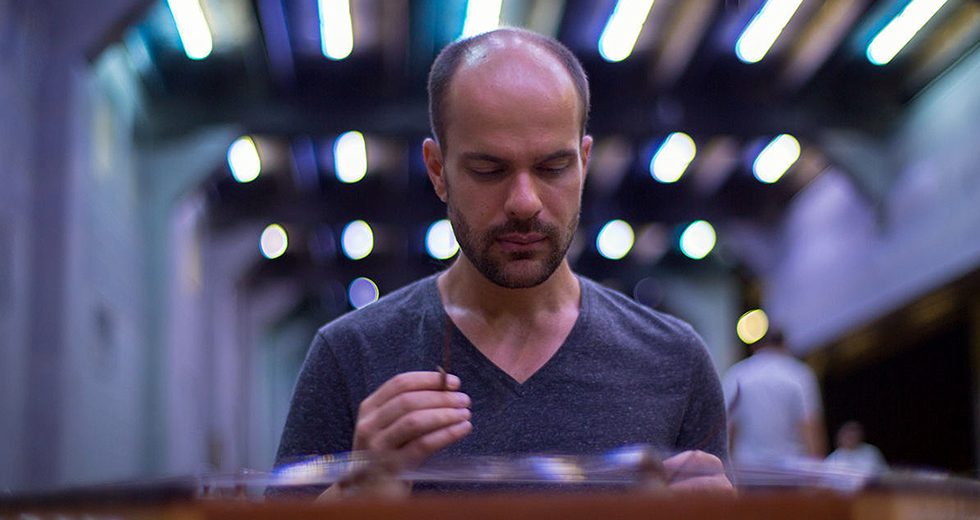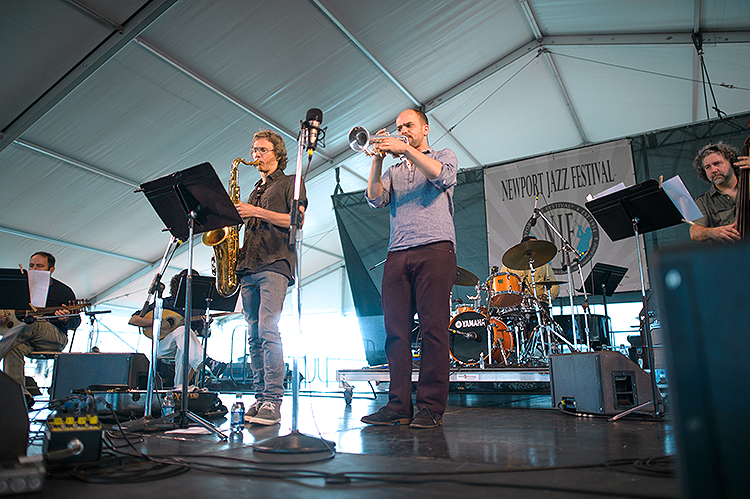
Trumpeter Amir ElSaffar could have pursued the career of an orchestral horn player anywhere in the world. But then he heard Samy el Bably, and life changed direction.
El Bably is an Egyptian trumpeter renowned for performing Arabic music on an instrument not associated with that genre. “He showed me it is possible to play Iraqi music on the trumpet,” says ElSaffar, 40, who grew up in River Forest. That was 1999. ElSaffar traveled from Chicago to Egypt to meet and learn from El Bably; the experience led to years of musical journeying between the Middle East and the United States, which has resulted in multiple albums that incorporate instruments, tones and rhythms that sound like they belong together, even if they originated from different worlds and time periods.
ElSaffar and his 17-member Rivers of Sound ensemble appear Feb. 9 in an SCP Jazz concert on a double bill with Chicago-based drummer and composer Mike Reed. Rivers of Sound is the name of ElSaffar’s most recent album and his current ensemble. Both are an exchange of instruments like the tabla, santur and buzuq from the eastern Mediterranean with those associated with big band jazz. Relying on improvisation as well as compositional melodies, the project seamlessly finds connections in the emotional highs and lows while never letting the unorthodox instruments dominate.

Amir ElSaffar (center) leads his Two Rivers ensemble at the 2013 Newport Jazz Festival. | Photo: Adam Kissick
ElSaffar, 40, got his first taste of jazz and classical in the music program at Oak Park and River Forest High School. Arabic music was mostly in the background of family events he attended during his youth; at home, jazz dominated his father’s record collection. When he got to DePaul University, his obsession with the trumpet found a home. He became a member of the Civic Orchestra of Chicago and recorded for and performed with Daniel Barenboim, then the CSO’s music director. The experience helped him understand sound in a large setting. “He was very insistent that [his musicians] understand the meaning of what they were playing, not just why,” ElSaffar says.
Besides gigging with local big bands and R&B groups around town, ElSaffar found that his true education came from studying under Adolph “Bud” Herseth, the CSO’s principal trumpet for more than 50 years. “He set very, very high standards for himself and for others to be very precise and to be always early and always prepared,” ElSaffar says. The experience introduced ElSaffar to the the aesthetic of the CSO brass. “For me, the model is the triumphant sound of the CSO brass,” he says. “As much as I do very different things on the trumpet today, it still feels like it’s of the essence of how I think of brass.”
After moving to New York in 1999, he traveled to Baghdad and London several times to immerse himself more in the Arabic maqam music tradition, learning different instruments and also developing his own vocals, as singing remains an important part of the tradition. The experience “was like falling in love.” “Something resonated at a deep level. I discovered part of myself I didn’t know existed through the music,” he says. “Because the music of Iraq is like the subconscious of Iraq. It tells a story and I needed to connect to that element of the culture.”
ElSaffar’s music lives in both worlds, from “Two Rivers” (PI Recordings), released in 2007, all the way through to the 2013 album “Crisis” (PI Recordings), which was influenced by the Arab Spring protests in Egypt. The instruments, those developed over centuries and others of the more recent era, compliment one another in tone and harmony. In Chicago, the ensemble will perform a single 80-minute composition that gives each of the 17 players a solo spot. The mission of each performance, he says, “is to be in a state of constant listening and creativity.”
His interest in merging Western jazz and Arabic music will continue, he says. While it may have seemed novel at the beginning, today the collision of cultures from disparate points on the globe reflects realities found in other realms, from geopolitics to the environment. “The world is changing so quickly. I’m interested in places where the boundaries are really melting, and it’s not so clear anymore,” he says. “Because there is something in those in-between spaces that is so essential to our human experience.”
Chicago-based journalist Mark Guarino writes for the Guardian, Crain’s Chicago Business, the Washington Post, Salon, the Chicago Tribune, Reuters, Agence France-Press and other outlets.